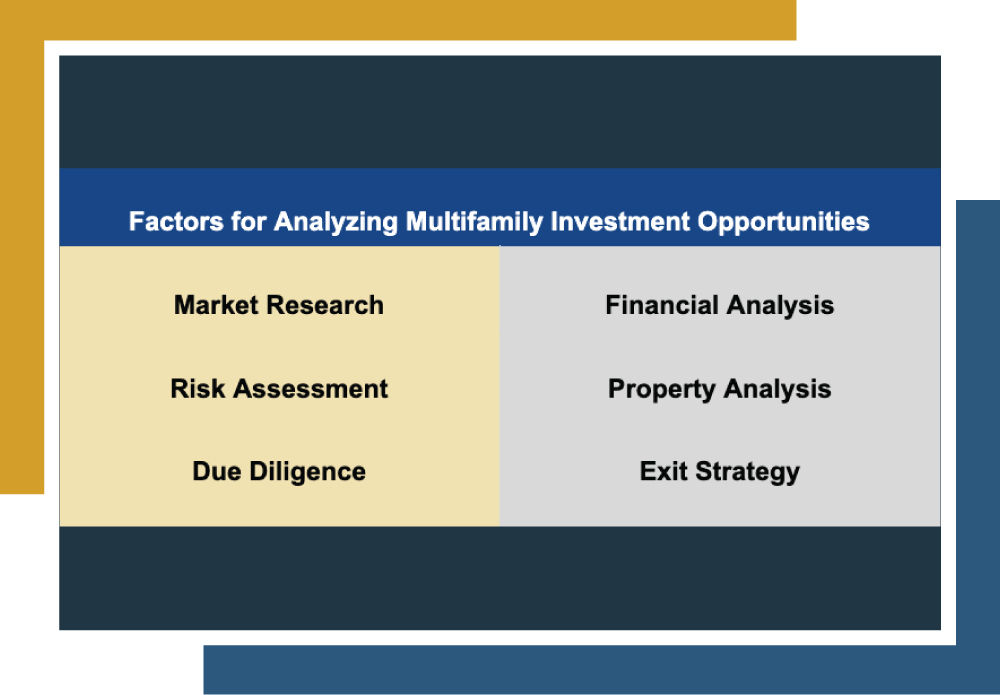Real estate investing can be a powerful tool for building wealth, with multifamily properties such as apartment buildings, condominiums, or duplexes offering many unique advantages. To make informed decisions and maximize your investment potential, it’s essential to understand how to analyze multifamily investment opportunities effectively.
This guide outlines the critical steps in analyzing multifamily investment opportunities, helping you start on the right foot.
How to Analyze Multifamily Investment Opportunities
Like any investment, knowledge is paramount for success in multifamily real estate. But beyond general knowledge, understanding how to analyze multifamily investment opportunities effectively is crucial. This analysis goes beyond simply knowing “what to look for”–it’s about strategically evaluating properties to determine their financial viability and potential for growth.
Factors for Analyzing Multifamily Investment Opportunities | |
|
|
|
|
|
|
|
|
|
|
|
|
|
|
1. Market Analysis
- Location: Assess proximity to amenities, transportation, schools, and businesses.
- Supply and Demand: Evaluate the balance between available rental units and tenant demand in the area.
- Economic Indicators: Examine critical indicators such as inflation, interest, and economic growth trends.
- Local Economic Conditions: Analyze the local economy’s health, including business activity and development projects.
- Job Growth: Investigate employment opportunities and industries driving job creation.
- Population Growth: Study trends in population increase or decrease, impacting rental demand.
- Other Factors: Include other relevant factors such as crime rates, school quality, and local policies that affect rental markets.
2. Financial Analysis
- Income: Review rental income and additional revenue streams like parking fees, laundry facilities, and vending machines.
- Expenses: Analyze operating costs, including maintenance, property management fees, taxes, insurance, and utilities.
- Net Operating Income: Calculate NOI by subtracting operating expenses from total income.
- Cap Rate: Determine the capitalization rate to understand the investment’s potential return.
- Cash Flow: Assess cash flow by subtracting mortgage payments from NOI.
- Return on Investment: Calculate ROI using the formula: ROI = (Net Income / Investment Cost) * 100%.
3. Property Analysis
- Physical Condition: Inspect the overall condition of the property, including structure, roofing, plumbing, and electrical systems.
- Occupancy Rates: Check current and historical occupancy rates to assess rental demand and stability.
- Amenities: Evaluate the quality and appeal of amenities such as parking, laundry facilities, common areas, and recreational facilities.
4. Risk Assessment
- Market Risk: Identify risks related to market fluctuations, economic downturns, and changes in rental demand.
- Property Risk: Evaluate risks specific to the property, such as structural issues, maintenance needs, and location-related concerns.
- Financial Risk: Assess financial risks, including interest rate changes, loan terms, and the investor’s creditworthiness.
5. Due Diligence
- Legal and Zoning Information: Verify that the property complies with local zoning laws and investigate any legal issues or restrictions.
- Tenant Leases: Review existing tenant leases for terms, rental rates, and tenant stability.
- Inspections: Conduct thorough property inspections to identify potential problems or required repairs.
6. Exit Strategy
- Resale Value: Estimate the potential value based on market trends and property improvements.
- Hold Period: Determine the ideal hold period for maximizing returns and aligning with investment goals.
7. Alternative Strategies
- Real Estate Investment Companies: These companies manage and invest in real estate assets, providing investors with opportunities to benefit from professional management and a diverse portfolio. They are suitable for those seeking hassle-free investment, passive income, and steady returns.
- Real Estate Investment Trusts: REITs are publicly traded companies that own, operate, or finance income-producing real estate, making them ideal for passive investors seeking liquidity and diversification.
- Syndication: Syndication pools funds from multiple investors to purchase larger properties. It suits those who want to invest in significant projects without full management responsibilities.
How Canyon View Capital Helps with Multifamily Investing
Understanding how to analyze multifamily opportunities is a decisive first step. However, diving into real estate can feel overwhelming. Unlike the simplicity of buying stocks, traditional property management often adds another layer of complexity, and multifamily investing isn’t an exception.
The good news? You can still reap the rewards of multifamily real estate without the burden of analysis or property management. Canyon View Capital offers a solution.
We invite accredited investors to invest with us and enjoy the hassle-free benefits of multifamily investing. We have a portfolio of multifamily properties and handle the in-depth analysis, property acquisition, and day-to-day management, and you simply collect passive real estate income.
Let Canyon View Capital Be Your Guide to Arkansas Real Estate Investing
Now that you know how to analyze multifamily investment opportunities, you may be considering your next step. If planning a thorough multifamily strategy seems a bit daunting, or if you’re put off by the idea of managing investment properties first-hand, we can help.
At Canyon View Capital, our passion is multifamily investing. We manage an extensive portfolio of multifamily properties throughout the Midsouth and Midwest, and we offer accredited investors like you the chance to enjoy the benefits of multifamily real estate, including potential tax advantages, without the burden of individual property analysis or day-to-day management.
Need more information on how to analyze multifamily investment opportunities?
We’re happy to help! Call CVC today to learn more. Get Started
Eric Fisher, Chief of Staff
Eric joined Canyon View Capital in August 2021 with 15 years of hotel management experience grounded evenly between Property & Corporate Operations, and Business Development & Acquisitions. After $500M+ in hotel acquisitions, Eric uses his nuanced understanding of the acquisitions and transitions processes to support CVC real estate investments. His professional versatility makes Eric an invaluable resource for the President and Executive Team in all business functions, including Investments, Operations, and Strategy.

